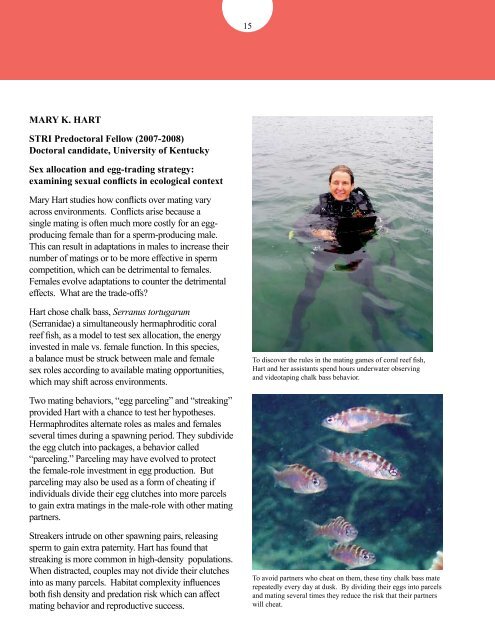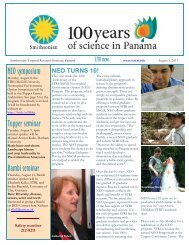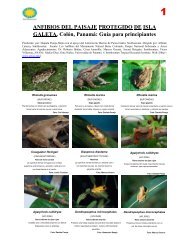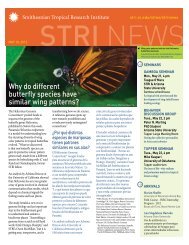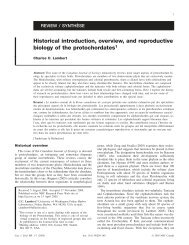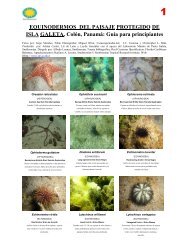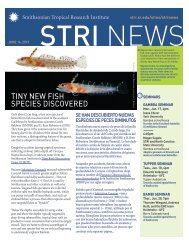Bocas del Toro Research Station - Smithsonian Tropical Research ...
Bocas del Toro Research Station - Smithsonian Tropical Research ...
Bocas del Toro Research Station - Smithsonian Tropical Research ...
Create successful ePaper yourself
Turn your PDF publications into a flip-book with our unique Google optimized e-Paper software.
MARY K. HART<br />
STRI Predoctoral Fellow (2007-2008)<br />
Doctoral candidate, University of Kentucky<br />
Sex allocation and egg-trading strategy:<br />
examining sexual conflicts in ecological context<br />
Mary Hart studies how conflicts over mating vary<br />
across environments. Conflicts arise because a<br />
single mating is often much more costly for an eggproducing<br />
female than for a sperm-producing male.<br />
This can result in adaptations in males to increase their<br />
number of matings or to be more effective in sperm<br />
competition, which can be detrimental to females.<br />
Females evolve adaptations to counter the detrimental<br />
effects. What are the trade-offs?<br />
Hart chose chalk bass, Serranus tortugarum<br />
(Serranidae) a simultaneously hermaphroditic coral<br />
reef fish, as a mo<strong>del</strong> to test sex allocation, the energy<br />
invested in male vs. female function. In this species,<br />
a balance must be struck between male and female<br />
sex roles according to available mating opportunities,<br />
which may shift across environments.<br />
Two mating behaviors, “egg parceling” and “streaking”<br />
provided Hart with a chance to test her hypotheses.<br />
Hermaphrodites alternate roles as males and females<br />
several times during a spawning period. They subdivide<br />
the egg clutch into packages, a behavior called<br />
“parceling.” Parceling may have evolved to protect<br />
the female-role investment in egg production. But<br />
parceling may also be used as a form of cheating if<br />
individuals divide their egg clutches into more parcels<br />
to gain extra matings in the male-role with other mating<br />
partners.<br />
Streakers intrude on other spawning pairs, releasing<br />
sperm to gain extra paternity. Hart has found that<br />
streaking is more common in high-density populations.<br />
When distracted, couples may not divide their clutches<br />
into as many parcels. Habitat complexity influences<br />
both fish density and predation risk which can affect<br />
mating behavior and reproductive success.<br />
15<br />
To discover the rules in the mating games of coral reef fish,<br />
Hart and her assistants spend hours underwater observing<br />
and videotaping chalk bass behavior.<br />
To avoid partners who cheat on them, these tiny chalk bass mate<br />
repeatedly every day at dusk. By dividing their eggs into parcels<br />
and mating several times they reduce the risk that their partners<br />
will cheat.


